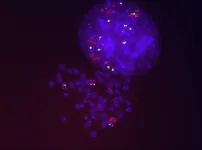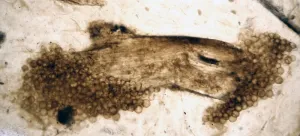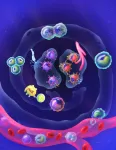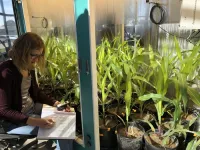(Press-News.org) A collaborative study carried out by the groups of Matthias Drosten, principal investigator at the Cancer Research Center (CSIC- University of Salamanca), and Mariano Barbacid, head of the Experimental Oncology group at the CNIO, reveals the mechanisms responsible for the development of tumor resistance to Sotorasib, the first approved inhibitor against the KRAS oncogene.
The study, recently published in the Journal of Clinical Investigation, shows that lung tumor cells can rapidly adapt to this drug by increasing the number of copies of the mutated KRAS gene targeted by the treatment and by increased expression of xenobiotic pathways that limit the amount of drug available to the tumor cells.
To carry out the research, these research groups designed a mouse tumor model that carries the same mutation present in the human tumors. The results obtained with these mice faithfully reproduced those observed in the clinic.
In addition, this work demonstrates that, if the KRAS oncogene could be completely inhibited by more potent drugs or degraders, the resistance observed in the clinic could be eliminated, or at least significantly reduced.
According to recent figures published by the Spanish Society of Medical Oncology (SEOM), more than 30,000 new cases of lung cancer will be diagnosed in Spain in 2023, making it the second most frequent type of cancer in this country. In addition to its high prevalence, its 5-year survival rate is one of the lowest of all cancers. In fact, lung cancer is by far the deadliest cancer --it caused more than 22,000 deaths in 2021.
Personalized therapies, targeting the specific biology of each type of tumor, are one of the great advances in cancer research in recent decades, their success due to the fact that they act specifically on genes and proteins involved in the growth and survival of cancer cells. Given that the KRAS gene is mutated in a quarter of lung cancers, personalized therapies against this mutated gene would be a breakthrough in the treatment of lung cancer patients.
In fact, 2021 was a significant year in the approach to lung cancer because the first personalized drug (Sotorasib), targeting the most frequent KRAS mutation in lung cancer -- which is a direct consequence of smoking-- was approved in the US. Specifically, Sotorasib inhibits the mutant KRASG12C isoform. Each year approximately 3,000 newly diagnosed people could benefit from Sotorasib in Spain.
However, most patients quickly develop resistance to the drug and the treatment is no longer effective. The group led by Matthias Drosten, from the Cancer Research Center (CSIC-University), is studying how resistance to Sotorasib arises, to develop better prevention strategies.
The group uses genetically modified mouse models, whose mutations in KRAS and other mutated genes trigger the development of aggressive tumors similar to those in humans. "We have seen - emphasizes Matthias Drosten - that one of the best strategies to treat these tumors is to inhibit KRAS, because in a second mouse model we have found tumor regression and cure in all cases when the mutated KRAS gene is completely eliminated."
Tumors adapt to the drug
It has been shown that resistance occurs because tumors can quickly adapt to the presence of the inhibitor. The treatment loses efficacy because the lung tumor cells, in response to the treatment, increase the copies of the KRAS gene.
In addition, a second cause explaining drug resistance and decreased drug activity has been detected in this study: transcriptional programs are activated (which allow the conversion of DNA into RNA) that increase the chemical modification of the drugs.
"These mechanisms studied in the mouse, says Marina Salmón, researcher in the Experimental Oncology group at the CNIO and first author of the study, are also present in some human tumors. Therefore, the results of this research may help to identify new forms of treatment adapted to each patient".
Towards new personalized treatments
This research opens the door to the design of new personalized treatments based on the following evidence. On the one hand, it has been found that tumor cells with gene amplifications lose their fitness when they are no longer exposed to the inhibitor, which could help to define new treatment guidelines. On the other hand, other drugs can be targeted to other molecules, such as NF-kB and STAT3 proteins, also identified in this study as possible mediators of resistance in lung tumor cells. In the event that resistance is detected through NF-kB and STAT3, inhibitors against these molecules are likely to be effective in reversing resistance.
With a wide variety of resistance mechanisms identified, lung cancer patients with the KRAS mutation who do not respond to treatments will need to undergo a personal analysis to detect what type of resistance the cells have developed so that treatment can be tailored.
Another challenge arising from this research, which would help to increase survival in lung cancer, would be to develop a therapy similar to the complete elimination of the KRAS oncogene from cancer cells.
In short, Drosten points out, "this research should encourage other researchers and the pharmaceutical industry to continue developing new therapies directed against KRAS".
END
Scientists identify the mechanisms leading to resistance to lung cancer treatment with Sotorasib, the first KRAS inhibitor
2023-03-17
ELSE PRESS RELEASES FROM THIS DATE:
Fossil site is ‘Rosetta Stone’ for understanding early life
2023-03-17
Fossil site is ‘Rosetta Stone’ for understanding early life
Leading edge technology has uncovered secrets about a world-renowned fossil hoard that could offer vital clues about early life on earth.
Researchers who analysed the 400 million-year-old-cache, found in rural north-east Scotland, say their findings reveal better preservation of the fossils at a molecular level than was previously anticipated.
Fresh scrutiny of the exquisitely preserved treasure trove from Aberdeenshire has enabled scientists to identify the chemical fingerprints of the various organisms within ...
3D-printed revolving devices can sense how they are moving
2023-03-17
Integrating sensors into rotational mechanisms could make it possible for engineers to build smart hinges that know when a door has been opened, or gears inside a motor that tell a mechanic how fast they are rotating. MIT engineers have now developed a way to easily integrate sensors into these types of mechanisms, with 3D printing.
Even though advances in 3D printing enable rapid fabrication of rotational mechanisms, integrating sensors into the designs is still notoriously difficult. Due to the complexity of the rotating parts, sensors are typically embedded manually, after the device has already ...
Tackling gambling harm among Armed Forces veterans
2023-03-17
Swansea University News Release
17 March 2023
£1 million for projects involving Swansea experts to tackle gambling harm among Armed Forces veterans
Research to tackle gambling harm among Armed Forces veterans has received a major boost with three awards, totalling £1 million, for new projects in the field that involve Swansea University experts.
The projects include evaluating a smartphone app for veterans with gambling disorder and PTSD, which is aimed at reducing symptoms,
The three projects ...
Rivers and streams in the Andean Cordillera are hot spots for greenhouse gases emissions
2023-03-17
A new scientific study by researchers from the University of Liège (Belgium) shows that rivers in the Andean mountains contribute 35% and 72% of riverine emissions of carbon dioxide (CO2 ) and methane (CH4 ) in the Amazon basin, the world's largest river. This study is published in the journal Communications Earth & Environment.
Rivers contribute substantially to global emissions of carbon dioxide (CO2) and methane (CH4). The Amazon River, the World's largest river, plays an important role in greenhouse gas (GHG) emissions. It is the largest river on the planet in terms of freshwater flow," explains Alberto Borges, ...
Dual-task walking performance may be an early indicator of accelerated brain aging
2023-03-17
Boston, MA -- Walking is a complex task that is most commonly performed while completing other tasks like talking, reading signs, or making decisions. For most, after the age of 65, such “dual tasking” worsens walking performance and may even cause unsteadiness. Intriguingly, older adults that are more affected by dual tasking are at higher risk of suffering adverse health outcomes, including both falls and dementia.
A new research study published in Lancet Healthy Longevity has reported that the ability to dual task when walking starts to decline by the age of 55, up to a decade before ‘old ...
New study counts the environmental cost of managing Japanese knotweed
2023-03-17
New Swansea University research has looked at the long-term environmental impact of different methods to control Japanese knotweed.
The invasive species has been calculated to cost more than £165 million to manage every year in the UK alone. Its presence can blight property purchases for households across the country.
This has led to the development of different ways of trying to control it but with sustainability becoming increasingly important, understanding the effect of these management methods is vital.
A new study, led by biosciences lecturer Dr Sophie Hocking and looking ...
Discovery of an unexpected function of blood immune cells : Their ability to proliferate !
2023-03-17
The ability of a cell to divide, to proliferate, is essential for life and gives rise to the formation of complex organisms from a single cell. It also allows the replacement of used cells from a limited number of “stem” cells, which then proliferate and specialize. In cancer, however, cell proliferation is no longer controlled and becomes chaotic. Researchers from the GIGA Institute at the University of Liège have discovered that, in a healthy individual, certain blood immune cells, the monocytes, ...
Women working rotating shifts especially likely to be frail, York study finds
2023-03-17
March 17, 2023, TORONTO — A new study led by researchers at York University has found a link between shift work and frailty among middle-aged and older workers in Canada, especially for women on rotating shifts.
While there is a large body of research suggesting the disruptions to circadian rhythms that shift workers experience are linked to various illnesses, this study was the first to take a comprehensive or “holistic” look at the connection between shift work and frailty.
“We cannot ignore the negative health outcomes related to shift work, including cardiovascular diseases, ...
Argonne hosts conference for undergraduate women in physics
2023-03-17
The U.S. Department of Energy’s (DOE) Argonne National Laboratory hosted an American Physical Society (APS) Conference for Undergraduate Women in Physics (CUWiP) on Jan. 20-22. The conference series, sponsored by DOE and the National Science Foundation, is designed to support undergraduate women and gender minorities in physics by connecting them with resources, community, information on graduate school and professionals in their field. It also provides students with access to other women in physics with whom they can share experiences, advice and ideas.
The January 2023 event is one of 14 APS CUWiP events hosted across the country and ...
How can we tackle the biggest challenges? Ask a plant
2023-03-17
LOS ALAMOS, N.M., March 16, 2023 — Without plants, we’d have no air to breathe or food to eat, yet plant science lingers in the shadowy wings while other fields take center stage. With the goal of shining the spotlight on plants, a new study presents the field’s top 100 most pressing questions for research to address the greatest challenges facing humanity.
“The study highlights the importance of plant science for society by laying out myriad questions and technical challenges ...







